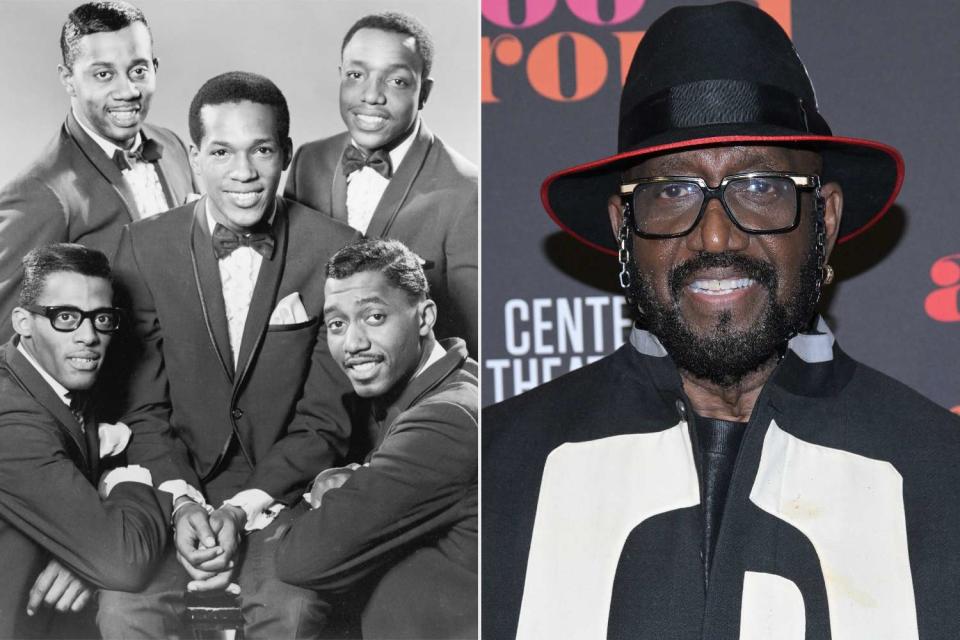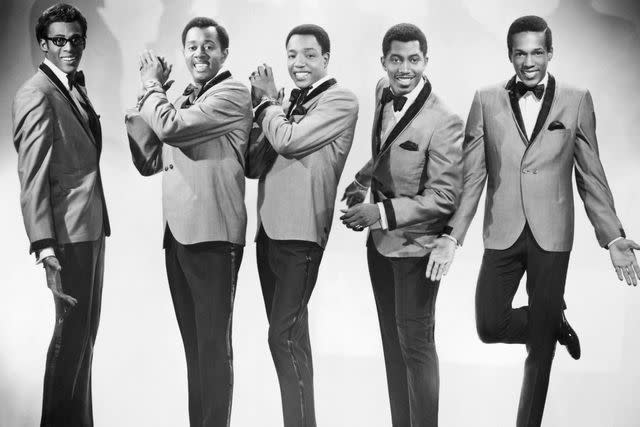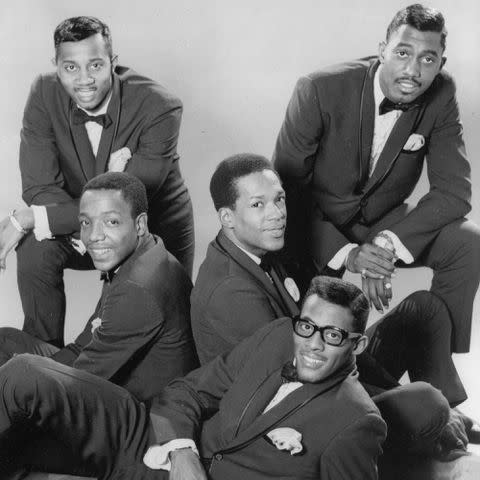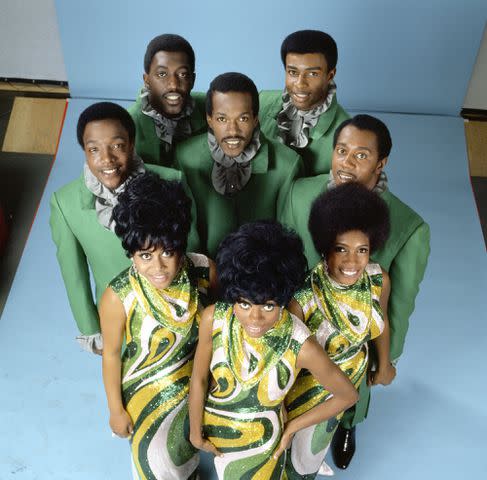The Temptations' Debut Turns 60: Otis Williams on Journey from 'No Hit Wonder' to Motown Legend (Exclusive)
Six decades after the group's debut LP, the surviving founding member spoke with PEOPLE about early hits, words of support from The Beatles, and keeping a legacy alive

Hulton Archive/Getty; Michael Tullberg/Getty
The Temptations in 1965, founding member Otis WilliamsBelieving in your art takes patience. And in 1964, Otis Williams had plenty of that.
While at this point in his storied career, the Motown legend and sole surviving founding member of The Temptations has since earned his place in history books at 82 years old, he can still remember those early years — between 1960 and 1964 — before the beloved vocal group ever scored a hit on the Billboard charts.
“The Supremes and the Temps, they were calling us the ‘No Hit Wonders’ because we had so many releases that none of them really jumped off,” Williams tells PEOPLE, now 60 years after the release of the Temptations’ April 1964 debut album, Meet the Temptations.
“See, most companies would just record you, and if you didn't do it on the first single, they'll drop you,” he adds. “If they loved you to any extent, they'll let you do two. But if you do not happen with the second single, they drop you like a bad habit.”
Unlike other label bosses, however, Berry Gordy would tell the Temptations — and other struggling groups — that it wasn’t the "fault" of the musicians. "'We've got to do better as a company, as a producer, as writers,'" Williams recalls of Gordy’s words. “And he stuck to that and he believed in us. And I love him because, like I said, most companies, they'll drop you, cast you away.”
As hard as it may be to believe, for a period of time in the early '60s, The Temptations simply could not gain traction on the charts. It wasn’t their tight stage performances, which Williams says they “prided ourselves in.” It wasn’t their singing, either. After all, this was a group consisting of (eventually) that classic lineup of vocal powerhouses David Ruffin, Melvin Franklin, Eddie Kendricks, and Paul Williams — along with Otis.
What it was, however, was timing. And after putting the work in with Motown’s artist development department, and landing on magic with the Smokey Robinson-penned “The Way You Do the Things You Do,” the Temps found their first hit song. That meant releasing their first album, just three months later, on April 13, 1964.
“First album, you never forget that. You’re set to really want to become a star and a recording artist. And so when the album came in, boy, you would've thought it was five Secretariats riding, ‘Da da dun, da, da, dun,’ running up there to get the album,” Williams says of himself and his fellow group members, all of whom he says were over 6-feet-tall in the mid-'60s. “And I got it, and I looked at it and I read every little credit nuance on the album.”
Six decades after The Temptations finally became a household name with “The Way You Do the Things You Do” and their debut LP, Meet the Temptations — and eventually hits like “My Girl,” “Just My Imagination (Running Away with Me),” “Ain’t Too Proud to Beg” and “Papa Was a Rollin’ Stone” in the months and years to follow — Williams is now reflecting on the moments that made that period in his life so special.
Speaking exclusively with PEOPLE about the album that launched his legendary career, Williams looks back on early encounters with the Jackson 5, the making of “My Girl,” and the moment he and bandmate David Ruffin cried when they found out they scored a hit song for the first time.
Highlights from the conversation, edited for length and clarity, follow below.

Michael Ochs Archives/Getty
The Temptations photographed in 1965, with Otis Williams appearing second from rightWhat do you think of when you hear those words, 'Meet the Temptations?'
We came out about the same time the Beatles were hot. And their first album was Meet the Beatles. And they had John, Paul, George and Ringo. And so when we had a hit with “The Way You Do the Things You Do,” I said, let's do Meet The Temptations. And they had us all sitting up there with the introduction of Paul, Eddie, Melvin and myself. So it was taken from the same thinking of the Beatles.
I understand a few months later when “My Girl” hit No. 1, The Beatles actually wrote you a telegram?
I have it at my house. It says, "Congratulations for ‘My Girl’ being No. 1." We were at the Apollo Theater, see we recorded "My Girl" the summer of '64. Motown released it near the end of December of '64, and it started running up the charts. So by February we were at the Apollo in '65 and I got a telegram from The Beatles, Berry Gordy, The Supremes, and Jules Podell, the guy that ran the Copacabana. And I have those four telegrams still hanging up in my home today.
And what did it mean for you, specifically knowing that the first album title emulated The Beatles?
It was a thrill that we had yet to overcome because we had been recording quite a [bit]... So to start having hits in the year of '64 all the way until now, I can't even find the right words to say, to put it in a real perspective because we had tried for so long to become successful. So when we got that first album, I must have sat and looked at that, boy I said, "Now I've got my own album," The Temps, because we were very noted in Detroit, but that first hit… here we are talking about 60 years later.
By the time you released this album, like you said, The Temps had been around for four years. You had several singles before that. The album largely consisted of those singles. Did it feel like it best represented the journey that you guys had been on up until that point?
Recording as many singles that we did and when we got “The Way You Do the Things You Do,” at first… I've always told the story that when Smokey called for us to come into the studio that cold January night and he passed out the lyrics to Paul, Eddie, Melvin, David, and myself. So as I'm reading the lyrics, "You've got to smile so bright, you could have been a candle, holding you so tight," I said, "What kind of crap is this? This is some hokey stuff here." So OK, we went down in the studio and we did the recording.
And after I sat and listened to it and how it all came together with David, Paul, Melvin, and myself and Smokey was in the control room. So I came in and I said, "Smokey you a bad man because you can take stuff that made no sense and it turns out making sense."
Do you remember when it was finally considered a hit?
Everybody was waiting for us to get that first big hit, that recognizable song that would really place us out there. We were a working group even back in those early stages. And so David had joined the group and we were up in Michigan, we worked all the inner places of Michigan. So we would be gone for two or three weeks at a time.So when we came back into Detroit, David and I, we came up to Motown. And one of the executives said, "Well man, where have you guys been?” So we said, "Well, we work until we get us a hit." He said, "Well, you got a hit."
So when we got the Billboard and we read that “The Way You Do the Things You Do,” we had jumped in about 76 or 77. Motown had a lounge in the lobby. And David and I sat down and we cried, because he had tried a number of years as a solo artist to get with us on our first hit. And The Temps, before David joined us, we had recorded a whole list of songs and that was the one. And that was the catalyst for us to be still being loved and accepted 60 years later.
And what did it feel like to share that moment with David when you found out about the success of the song?
Oh, it was a wonderful feeling because David was a noted soloist before he came with The Temps. But to see David in person as a solo artist, he was dynamic. And I was really amazed when he said, "Man, I want to sing with your group." I said, "Really?" We had built a name in Detroit. And David used to do record hops with us. And then he came out to some of the shows and watched us, and eventually he joined the group. And from '64 to '68, we were hot as a box of cayenne pepper.

Hulton Archive/Getty
The Temptations photographed in 1965, Otis Williams posing in the top rightCould you feel a significant change in the size of the crowds?
Oh yeah. Well, we have always prided ourselves in being tight, choreographically, harmony wise and presentation for us, looking like a group should look. And so we were accepted from that. And once we started having hit after hit, we were able to get flashier uniforms and we would rehearse with notable choreographers and voice coaches to really spit shine.
We broke every existing record at the Copacabana. Now I'm speaking of a place, Frank Sinatra, Sammy Davis Jr., Tony Bennett, Perry Como, heavyweight artists have been there and performed, and yet here come these five southern brothers from and we would turn the place out. And we were just doing our song.
How important was it for you to step out like you did at these TV and public appearances, dancing like you did?
Well, first of all, you must remember we were still young. We were 22, 23. So we had a lot of vigor to do that. And our presentation, we were very conscientious about how we liked to be received. Once we got on stage, we always would talk about that at rehearsal, the right kind of presentation and hear ourselves like consummate professionals.
… Aside from us being able to sing anything, all of us was six footers, which is kind of unheard of because you have groups that one guy's tall, one guy's medium, one guy's in between, one is fat — not to make any joke about other acts, but we saw that. The disc jockey said, "Man, you guys are tall, talented Temptations." Next thing you know, the disc jockey is across through the country stars, "Here come the five tall, talented Temptations." All of us are the same height and slim. And I guess the girls found us to look pretty decent as well.
You mentioned Smokey. What did that era mean for your creative relationship?
We always had that wonderful relationship with Smokey because he's Smokey. I once said, "Smokey, I have never seen you mad except for one time at the Howard Theater." "Oak, whatever," because he called me Oak. I said, Smokey was in the men's room, and I guess he wasn't coming out quick enough. And Bobby Rogers had to go. So Bobby kicked the door and Smokey was in there. And when Smokey came out, “Man, you almost kicked me in my head.” So that's the only time I saw Smokey really be mad. And that was '65, '66 there about. But he's been a sweetheart ever since.
Just months after that first LP release, you released “My Girl.” What was it like to perform it early on?
I tell the story about when Paul was in the group, he was the one that would line up the show. So after "My Girl" went up high [on the charts] and laid up there for a few weeks, and then it came down, Paul said, “Well, ‘My Girl’ has done all it's going to do. We can take it out now because that's it." We went out on the stage and we performed. We did not do “My Girl.” The audience almost called us every name except “the child of God.” So that is one song that can never ever come out of the [setlist].
You’ve previously talked about how you knew it was going to be a hit record when those strings and those horns were first put in. To you, how would you describe the feeling of knowing that you landed on something special?
Smokey came to see The Temps at a popular club in Detroit called The 20 Grand. It was packed. The show was packed and Smokey came backstage to see David and Eddie, Paul, Melvin, and myself. And Smokey was ranting and raving about how great the show was. And then during the course of him running that down, he stopped and he looked at David, he said, "I've got a song for you." So us being young and cocky men, "Bring it on. We can sing anything."
We then had to go to the Apollo and worked the Apollo with Smokey and Miracles and a few other acts. Smokey was the headliner. We were co-staring. In my home I have a picture of where Smokey was rehearsing with us backstage in the dressing room. And when he played [“My Girl”] for us, we weren't going to turn down Smokey. So we went to Detroit and recorded “My Girl” and said, "OK, sounds good." But that song took on a whole 'nother daylight when Paul Riser added the strings and the horns on it. I'm sitting there in the studio and I'm listening, and I said, "Oh, this song has taken on a whole 'nother fervor."
I walked into the studio control room where Smokey was, and I said, "Smoke. I don't know how big a record this is going to become, but this is going to be a record." Motown released 'My Girl' the end of December '64, and like I said, February of '65, we were at the Apollo. And when I said earlier about a "congratulations" telegram, and I never would've imagined it would be that big of a hit, but everywhere we would go, even today, people love that song.
Beyond just Smokey, how would you describe the collaborative environment of Motown in the '60s looking back at it?
When I look back, that was a special time. That was God's definitive touching because the music that came out of Motown is priceless. It is something that they'll never ever be a recording company like Motown… So I'm just glad that we are part of something that's so histrionic in the sense of it'll be loved and appreciated. Here it's 60 years later and people still love Motown music, so it'll continue on.

Paul W. Bailey/NBCU Photo Bank/Getty
The Temptations and The SupremesWhen you look back at memories and conversations with the Jackson 5 in particular in the late ‘60s, do you have a favorite?
Well, one of the things I always remember is, one night, I'm riding around in Detroit and I said, "Let me drive by Motown." So when I drove by Motown, there were a lot of cars sitting out front. I said, "OK, let me go in and see what's happening." So I got out of my car and walked in and went into the control room. There was the Jackson 5.
So when I walked in, they looked at me like, "That's one of the Temptations." I'm looking at them. "Wow, that's the Jackson 5." That kind of love back and forth because I was in awe of them as they were in awe of The Temps, and I was just the only one out there at that point in time. And to watch them become the noted artists that they are known for, and Michael, that's something special. And so I'm just glad that we had the moment and the time to share at Motown. That's also what made Motown so uniquely different because it just had a whole 'nother kind of fervor of artists and all the wonderful artists that came out of Motown that are still loved today.
The Temps are still going so strong today and continuing to build this legacy. You live it every day. What do you hope your legacy is 60 years from now, 64 years from now?
I hope that it'll still be loved as it is 60 years at this present time. And I think it will be because like I said, Motown had that division called artist development, and we had to go to school… Berry had a whole-nother approach and I can't help but love him, man, they still believed in you. Most companies, they’d say, "No, I'm not going to spend any more money on them." They were going to drop them. Berry didn't do that. He believed in his artists to the max.
For more People news, make sure to sign up for our newsletter!
Read the original article on People.
